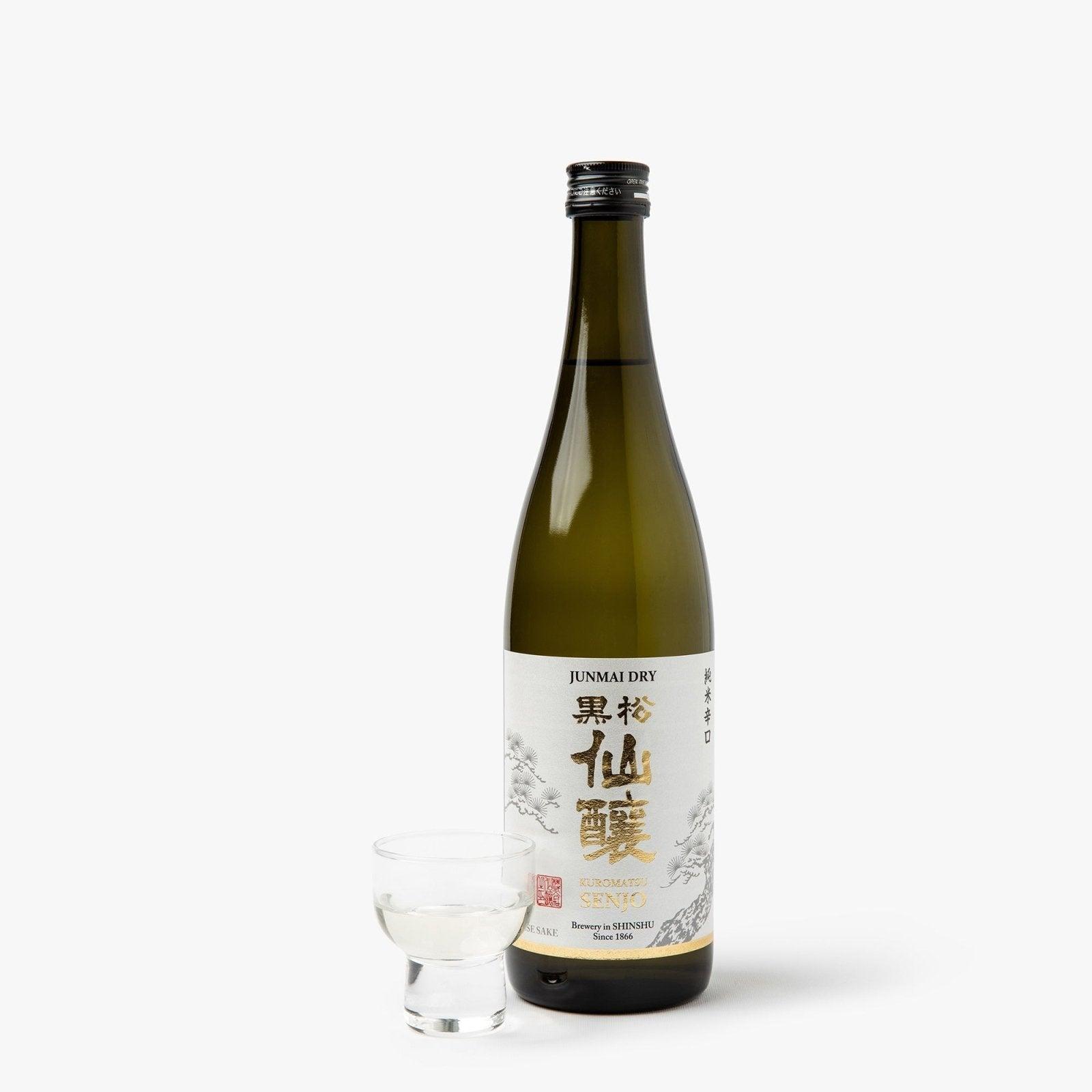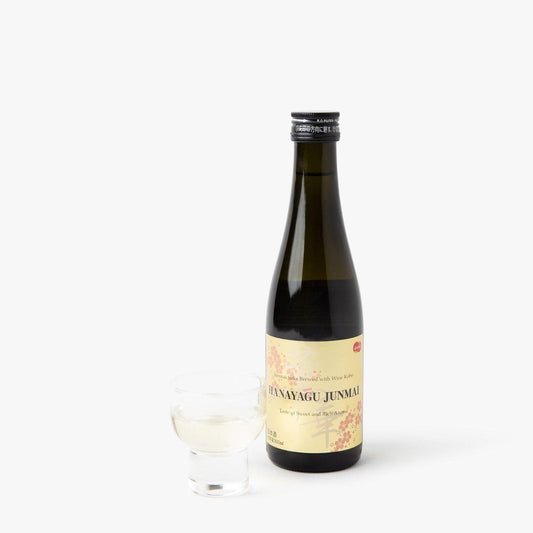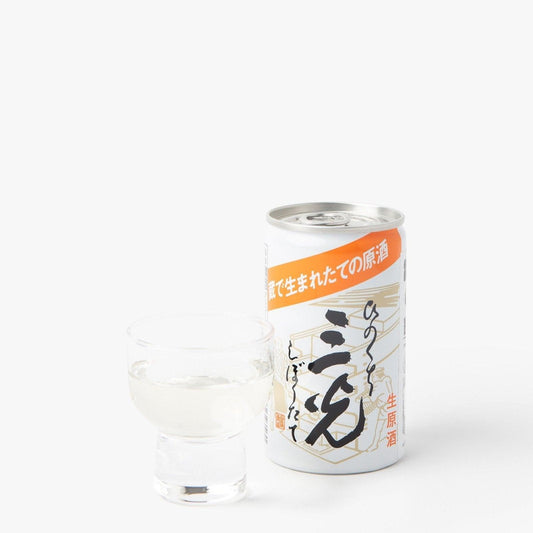Collection: Japanese sake
Explore the elegance and diversity of Japanese sake, ancestral drink very present in Japanese culture, thanks to our exclusive selection. With more than 400 aromatic components, twice as much as in wine, sake is a drink with exceptional complexity and finesse.
Amateur, first time or curious, discover our three selections: tasting, discovery and curiosity. Each has its varieties, its subtle flavors and its traditions which make sake a millennial art.

-
Saké kuromatsu senjo junmai ⋅ 16% ⋅ 720ml
A sake has round, precise and soft flavors that end with great sharpness.
Usual price 21.00 €Promotional price 21.00 € Usual price 21.00 €Unit price 29.17 € / by lSaké kiseki no osake junmai ginjo ⋅ 15.5% ⋅ 300ml
A smooth texture accompanied by an elegant aroma, both floral and fruity, with a sweetness which develops subtly and which ends clear.
Usual price 14.50 €Promotional price 14.50 € Usual price 14.50 €Unit price 48.33 € / by lSaké awayuki sparkling junmai ⋅ 5.5% ⋅ 300ml
This weakly alcoholic sparkling sake is ideal during festive or aperitif evenings. Its soft profile and its intense fruity make it a pleasant and refreshing drink....
Usual price 11.00 €Promotional price 11.00 € Usual price 11.00 €Unit price 36.67 € / by lSaké shirakawago sasanigori junmai ginjo ⋅ 16% ⋅ 300ml
For a nigori, this sake is rather dry. It has an aromatics carried on the notes of fermentation, with a pleasant lactic acidity counterbalanced by fruity...
Usual price 11.90 €Promotional price 11.90 € Usual price 11.90 €Unit price 39.67 € / by lSake sasara tsuki junmai ⋅ 10% ⋅ 300ml
The sake sasara tsuki junmai comes from the prefecture of Yamagata, a region where mineral water is abundant and high quality rice. It has a soft...
Usual price 8.90 €Promotional price 8.90 € Usual price 8.90 €Unit price 29.67 € / by lSaké kaori hanayagu junmai ⋅ 12% ⋅ 300ml
A unique sake made with wine yeast. Its aromas are very floral and its unique taste accompanies both Japanese and Occidenal cuisine.
Usual price 9.80 €Promotional price 9.80 € Usual price 9.80 €Unit price 32.67 € / by lSaké fukukomachi junmai ginjo ⋅ 15.5% ⋅ 720ml
Produced in a 400 year old brasserie, Kimura Shuzo, this sake is fruity and soft with a good balance of perfumes. It can be eaten easily...
Usual price 29.00 €Promotional price 29.00 € Usual price 29.00 €Unit price 40.28 € / by lSaké kubota senjyu ginjo ⋅ 15% ⋅ 720ml
Self -proclaimed "perfect for meals", this sake goes perfectly with a cold entrance before being reheated at room temperature to accompany your main dish. The Kubota...
Usual price 32.00 €Promotional price 32.00 € Usual price 32.00 €Unit price 44.44 € / by lSaké dassai 45 junmai daiginjo ⋅ 16% ⋅ 720ml
"There is no reason for us to develop a sake if it is not really delicious", this is Dassai's vision! It is here using 45% polished...
Usual price 36.00 €Promotional price 36.00 € Usual price 36.00 €Unit price 50.00 € / by lSaké kuromatsu senjo muroka genshu junmai ⋅ 16% ⋅ 720ml
This underessive and non -diluted sake is rich in Umami, with a earthy taste. Serve as fresh.
Usual price 29.00 €Promotional price 29.00 € Usual price 29.00 €Unit price 40.28 € / by lSaké kisaki blanc 65 junmai ⋅ 17% ⋅ 720ml
A dry sake, with strong acidity and the rich flavors of Gohyakumangoku rice. Can be served both hot and cold.
Usual price 27.00 €Promotional price 27.00 € Usual price 27.00 €Unit price 37.50 € / by lSaké monsay gold junmai ginjo ⋅ 14.9% ⋅ 720ml
An Omachi Junmai Ginjo with sublime fruity notes of yellow fruits, such as apple, pear, pineapple and banana, supplemented by wheat and buckwheat cereal notes. Its...
Usual price 23.00 €Promotional price 23.00 € Usual price 46.00 €Unit price 31.94 € / by lSaké sanko hinokuchi ⋅ 20% ⋅ 200ml
A non-pasteurized, intense, balanced and dry sake. You can also freeze it to make it a sake sorbet!
Usual price 7.90 €Promotional price 7.90 € Usual price 7.90 €Unit price 39.50 € / by lSaké tengori junmai ⋅ 15.5% ⋅ 720ml
A net Honjozo, soft and pleasantly delicate, which has aromas of mushroom and toast in butter. The last note is slightly peppery and acidic.
Usual price 33.00 €Promotional price 33.00 € Usual price 33.00 €Unit price 45.83 € / by lSaké dassai 39 junmai daiginjo ⋅ 16% ⋅ 720ml
Fruit of the know-how of the Asahi Shuzo brewery, the Dassai 39 represents excellence in the category of high-end sakes. It is a Junmai Daiginjo, with...
Usual price 50.00 €Promotional price 50.00 € Usual price 50.00 €Unit price 69.44 € / by lSaké cokun junmai ⋅ 8% ⋅ 500ml
A unique pink sake, due to the particularity of its yeast: it does not produce adenine and naturally takes a red color. This sake is low...
Usual price 21.00 €Promotional price 21.00 € Usual price 21.00 €Unit price 29.17 € / by lSaké tokachi junmai ginjo ⋅ 16% ⋅ 720ml
A sake with light and balanced aromas, with exotic notes like lychee and a length on rice notes. It is a very easy to drink sake...
Usual price 16.00 €Promotional price 16.00 € Usual price 32.00 €Unit price 22.22 € / by lSaké tokachi junmai ⋅ 15% ⋅ 720ml
This powerful and dry sake is made with a mixture of three local Hokkaido rice: Comet, Ginpu and Kitashizuku which are 70%polished. The water used for...
Usual price 22.00 €Promotional price 22.00 € Usual price 22.00 €Unit price 30.56 € / by lSaké kuro obi dodo junmai ⋅ 15% ⋅ 720ml
This sake is produced with a mixture of Yamadanishiki and Kinmonnishiki rice. Its dry and unique taste goes perfectly with rice. It is perfect with seafood...
Usual price 35.00 €Promotional price 35.00 € Usual price 35.00 €Unit price 48.61 € / by lSaké kuromatsu senjo junmai ginjo ⋅ 16% ⋅ 720ml
A round and fragrant sake with a pleasant Umami taste. Serve fresh.
Usual price 35.00 €Promotional price 35.00 € Usual price 35.00 €Unit price 48.61 € / by lSee more

The sake is sacred!
: de la fabrication, aux type des sakés et à la dégustation, jusqu’au choix de la bouteille
Learn more about the sake
What is sake?
THE sake is a traditional Japanese alcoholic drink made from fermented rice. Unlike popular belief, sake is not a rice wine, but rather a fermented drink that is between beer and wine in its manufacturing process. The sake alcohol content generally varies between 15 % and 20 %. The sake is appreciated for its great diversity of flavors, ranging from dry to dry, and for its delicate aromas which depend on the type of rice used and the degree of polishing of the grain.
What is the difference between sake and wine?
The main difference between the sake and the wine lies in their raw materials and manufacturing process. The wine is made by fermentation of the grapes, while the sake is produced from rice, water, yeast, and a fungus called koji. Wine fermentation is a simple process where grape sugar is transformed into alcohol by yeasts, while sake requires double fermentation: first, koji converts the starch of sugar rice, then yeast transforms this Alcohol sugar. In addition, sake has a higher alcohol content than wine, and its flavors are often more subtle and less tannic.
How to keep the sake once the bottle is open?
To keep the sake once the bottle is open, here are some tips to follow to preserve its quality and aromas:
1. Refrigeration:
- Once opened, the Saké bottle must be kept in the refrigerator. The cold slows oxidation and helps maintain the flavors of the sake. Depending on the quality of the sake, it can be kept cold between 15 days and a month.
2. Use an airtight cap:
- If the bottle has no hermetic cap, it is advisable to use a silicone cap or a cap specially designed for wine. This limits exposure to air.
3. Quick consumption:
- The open sake must ideally be consumed in the days that follow, but it can be kept up to two weeks in the refrigerator. Some high quality sakes can even keep their taste for several weeks if they are well closed and refrigerated.
4. Storage sheltered from light:
- Light can alter the quality of the sake. Keep the bottle in a dark place or use an opaque blanket for the bottle if it is in the refrigerator.
5. Position of the bottle:
- If possible, keep the bottle standing. This minimizes the surface of sake exposed to air and reduces the risk of oxidation.
By following these tips, you can extend the life of your sake and appreciate its flavors at best!How is the sake made?
There Manufacture of sake is a complex and delicate process that begins with the selection of rice, called Shuzo Kotekimai, specially cultivated for sake. The rice is first polished to remove the outer layers from the grain, then washed, soaked and steamed. Then, part of the cooked rice is mixed with koji, a fungus that breaks down the sugar starch. This step is followed by fermentation, where additional cooked rice, water and yeast are added to produce alcohol. After several stages of fermentation, the mixture is in a hurry to extract the sake, which is then pasteurized, aged and bottled.
What are the different types of sake?
THE sake There are several types, classified mainly depending on the degree of rice polishing and the production method. The main types of sake are the Junmai, which is a pure pure rice sake added alcohol; THE Honjozo, which contains a small amount of alcohol added to improve taste; THE Ginjo, a high quality sake with rice polishing at 60 % or less; and the Daiginjo, even more refined with a 50 % or less polishing. Each type offers a range of unique flavors and aromas, dry and robust fruity and floral.
Quelle différence entre le saké à boire et le saké de cuisine ?
1. Saké à boire (酒, "nihonshu")
- Qualité : Le saké à boire est un produit de qualité supérieure, fabriqué pour être dégusté pur, froid, tiède ou chaud, selon les préférences.
- Processus de production : Ce saké est produit à partir de riz poli (le plus souvent poli à 30% ou plus) et contient des arômes délicats qui sont appréciés lors de la dégustation. Le processus de fermentation est plus raffiné pour créer des saveurs complexes.
- Saveur et texture : Il a un profil gustatif plus subtil et nuancé. Selon le type de saké (junmai, ginjo, daiginjo, etc.), il peut avoir des arômes floraux, fruités, ou terreux, et une texture soyeuse.
- Utilisation : Il est destiné à être consommé en accompagnement de repas ou dégusté seul. Le saké de qualité est souvent servi lors de cérémonies ou pour des occasions spéciales.
2. Saké de cuisine (料理酒, "ryōrishu")
- Qualité : Le saké de cuisine est de qualité inférieure, utilisé principalement pour cuisiner. Il est souvent plus cher que le vin de cuisine ou l'alcool de cuisine en général, mais sa saveur n’est pas conçue pour être dégustée.
- Processus de production : Le riz utilisé pour le saké de cuisine est souvent poli moins finement et il contient plus de sel et d'additifs pour mieux se prêter à la cuisson. Ce saké est parfois enrichi avec de l'alcool distillé, du sucre et du sel.
- Saveur et texture : Ce saké a un goût plus prononcé de "brutalité" alcoolique et de sel, qui peut rehausser les saveurs des plats, mais il n’a pas la finesse du saké à boire.
- Utilisation : Le saké de cuisine est utilisé pour ajouter de la profondeur aux sauces, aux marinades, aux plats mijotés, et pour attendrir la viande ou le poisson. Il est également utilisé pour retirer l'odeur de certains ingrédients, comme le poisson ou la viande, et pour équilibrer les saveurs des plats.
What is the difference between Junmai and Daiginjo?
The difference between the Junmai and the Daiginjo Resides mainly in the degree of polishing of rice and the purity of sake. THE Junmai is a pure rice sake without adding alcohol, offering richer and more pronounced flavors. THE Daiginjo, as for him, is a very refined sake where rice is 50 % or less polished, which gives it lighter, floral and fruity aromas. Daiginjo may or not contain added alcohol, but it is generally considered more delicate and sophisticated than junmai.
What is the difference between modern, traditional and nature sakes?
Modern, traditional and nature sakes are three distinct categories that differentiate themselves through their production methods, their ingredients and often their flavors. Here is an overview of each type:
1. Traditional sake:
- Traditional sakes are produced according to ancestral methods that date back to hundreds of years. They are mainly made from rice, water, yeast and koji (malted rice). They do not contain any adding of distilled alcohol. They tend to be rich, complex and often more full in flavors. They have a more sustained acidity because the emphasis is on fermentation. Their aromatic profile is more expressive on yeast, rice and water quality notes.
2. Modern sake:
- Modern sakes may include variations in relation to traditional production methods. They can contain added alcohol additions (brewing alcohol) to adjust the flavor profile and the texture of the sake. These sakes can be lighter and softer in comparison with traditional sakes. They are often more accessible to beginners due to their softer and smoother flavor profile. They are very often compared to white wines because of their aromatic profile which is very often more fruity and more floral. These are sakes that are more expressive on the nose compared to Moderns.
3. Nature sake:
- Sakés qualified as "natural" are distinguished by their low degree of polishing of rice, thus retaining a larger amount of material. They are also characterized by the lack of addition of yeast (or kobo) during fermentation. Producers rather favor natural fermentation, leaving the native yeasts present in the air perform the fermentation process. This approach promotes the development of unique and authentic flavors, resulting from the interaction between local yeasts and natural components of rice.
It is interesting to taste sakes of each of these types in order to understand the aromatic complexity of this alcohol and to allow you to know which one best suits you.Which sake to choose to accompany a dish?
The choice of sake To accompany a dish depends on the type of dish and the flavors you want to highlight. For light dishes such as sashimis or seafood, a Ginjo Or Daiginjo With subtle and delicate aromas will be perfect. For richer and tasty dishes, such as grilled meats or simmered dishes, a Junmai Or Honjozo More full -bodied will bring a good complementarity. The sake can also be served hot or cold, depending on the type and the dish, to better exhale its aromas.
How to taste the sake?
There Saké tasting is an art that depends on the type of sake and the service temperature. The sake can be tasted cold, at room temperature or hot, depending on its characteristics. Light and fruity sakes, such as Ginjo and the Daiginjo, generally taste cold to preserve their delicate aromas. More robust sakes, such as the Junmai and the Honjozo, can be heated slightly to exhale their flavors. It is recommended to serve the sake in small glasses called ochoko, to better appreciate its shades.
What glasses to use for sake?
THE sake Traditionally tasted in small glasses called ochoko or in named ceramic cuts Sakazuki. THE ochoko are small and allow you to slowly sip the sake while enjoying its aromas. For more refined sakes like the Daiginjo, some prefer to use white wine glasses to better concentrate the aromas and appreciate the complexity of the sake. The choice of glass can vary depending on the type of sake and the opportunity, but the main thing is to choose a container that respects the tradition while highlighting the characteristics of the sake.
Can we warm the sake?
Yes, it is possible to Reheat the sake, but it depends on the type of sake. Sakes like the Junmai and the Honjozo Can be heated gently to exhale their rich and deep flavors. The sake is generally heated to a temperature ranging from 40 ° C to 55 ° C. To warm the sake, it is advisable to use a double boiler to avoid overheating and altering your aromas. More refined sakes like the Daiginjo or the Ginjo However, are better appreciated cold or at room temperature to keep their delicate aromas.
Chercher des recettes pour accord mets et saké
-

-
Free delivery
*From 50 € in relay point in France
*From 80 € at home in France
* From € 100 at home in Europe
-

-
10% reduction
*On your next order by registering for our newsletter
-

-
Dedicated area
In Japanese cuisine at 40 rue du Louvre, Paris 1
-

-
Secure payment
SSL encryption
- The choice of a selection leads to updating the whole page.
- Opens in a new window.


























































